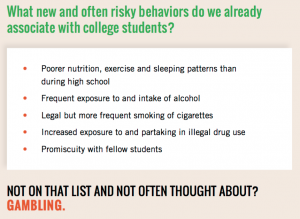College and Problem Gambling Posted On
The summer is coming to an end and students are moving on to their next level of education, which may be college. Going off to college is an amazing time of growth, learning and self-exploration. Learning about all the world may have to offer shows many youths how limitless life can be. With this feeling of limitlessness, youth may be unaware of problems that may lay ahead, like problem gambling.
Change for Everyone
Heading to college may be a time of excitement. For parents, it’s a time that they get to see their youth take the next step into adulthood. It may be a time where they get to see their youth spread their wings and explore all the world has to offer. It can be an amazing time of change for everyone.
Anytime there is a change in someone’s life, there is an opportunity for problems. Youth who are leaving home for college will experience many changes. They may be living in a new place with new people. Their school may be in a new community and not even know where the local coffee shop is. They may be leaving all of their friends and family behind.
Risks of Leaving Home
All of these change that youth experience have risks because they may be leaving all of their protective factors behind. Protective factor is a term to include all things that help people live healthier lives. These include positive role models like parents or youth leaders, belonging to positive groups like sports teams or faith-based communities, and living in a community that is safe.
When youth move off to college, they may be leaving most if not all of the things behind that helped, they live wonderful healthy lives. They’ll need these protective factors as they face a list of new or increased risky obstacles.
Youth and Gambling
There are a lot of reasons youth may choose to gamble. Whatever their reasons, there are a number of risk factors that can put youth at increased risk of struggling with problems from gambling. Youth are at an increased risk if they are male and have other mental health or addiction disorders. Plus, if they are already risk takers and keep the company of peers who gamble and struggle with other problem behaviors, they are more likely to have problems with gambling.
Youth who come from families who do not object to youth gambling and may not understand the risks of youth gambling are more at risk. They are also more at risk if their family has a history of addiction and/or illegal activities. Finally, a youth’s community’s attitude towards gambling plays a roll. If the community lacks awareness of youth gambling risks and offers opportunities for youth go gamble, youth will see gambling as a risk-free activity.
Problems from Gambling
Youth who are at an increased risk, have not been exposed to gambling, or don’t understand how gambling works can easily fall victim to problem gambling. Problem gambling is defined any time gambling causes problems in someone’s life. Some problems that youth may experience from gambling include:
- Missing classes or entire school days
- Sudden drop in grades
- Less interest in extracurricular activities
- Grater interest in money and value of possessions
- Winning or being right
- Money is lost or going missing
Obviously, none of these problems are good for the success of a student in college. Therefore, it’s important to take some steps to help youth make healthy choices for themselves.
What YOU Can Do
As a parent or loved one of a youth going off to college, you can make a difference in their life. There are things you can do to continue to guide youth towards healthier decisions and avoid the problems associated with problem gambling.
Communication: Keep a strong line of communication open with your youth. Show continued interest in their life and share the great things that are going on at home. Keeping the lines of communication open and healthy will help keep you aware of their life and allow you to offer guidance when needed.
Education: Learning more about youth gambling and problem gambling can only raise your awareness to warning signs. Your knowledge can help you guide your youth as you continue your relationship into their next phase of life. A great place to start is our e-book The Dangers of Youth Gambling Addiction. This e-book takes this blog post and goes into greater depth of what to look for and what to do.
If needed, get support: There is support available across New York State. If you believe your youth may be experiencing a gambling problem in New York State, reach out to your local Problem Gambling Resource Center. Here, you’ll be greeted by a dedicated professional ready to offer you additional information and resources about problem gambling and/or connect you or your youth with a trained clinician. You are not alone, and they are here to help.
We hope your family enjoys a fantastic transition from home to college. With this transition, remember that there is help for those in need for problems with gambling at NYProblemGamblingHELP.org.


